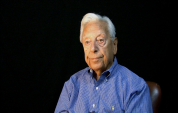3:07 | Did he take it personally since he was Jewish? No, says Hank Freedman, he was just there to serve his country. The former POW reflects on his upbringing and the legacy of World War II veterans.
Keywords : Hank Freedman Prisoner Of War (POW) Jew Jewish Boston MA

He was an enthusiastic draftee in 1942. Hank Freedman excelled at the tests he was given and was sent to engineering school under the ASTP program. Before he could graduate, the program was scrapped because they needed the manpower in the infantry. His unit had left, so he was sent to the 106th Infantry Division, a fateful assignment.
The 106th Infantry Division was newly formed and inexperienced when they replaced another division on the front in the Ardennes Forest. No one thought there was any danger of an attack at that location, but Hank Freedman found out just how wrong that was. His unit faced the full fury of the German offensive at the Battle of the Bulge and found themselves surrounded.
The 106th Division was decimated. The German attack through the Ardennes broke and scattered the American line and thousands of GI's were captured. Among them was Hank Freedman. He describes the fierce battle and the confusion and chaos as the Germans surrounded and captured him.
The day after he was captured, the Germans put Hank Freedman and the others on the road. They were eventually put in rail cars that were filthy and began a trek to prison camps, always a target for Allied planes seeking out German trains. He survived the friendly fire, though all were not so fortunate.
The prison camp at Bad Orb was at the top of a small mountain, overlooking the town. When POW Hank Freedman arrived, the guards said for all the Jewish prisoners to step forward. What followed was a moment worthy of Spartacus. Then they wanted the POW's to fill out extensive forms with all kinds of information. No way.
As a non-commissioned officer, POW Hank Freedman was not required to work. The privates and PFC's were not so lucky. Many died laboring for the Germans. He never received the Red Cross packages he was due, though they did visit the camp. Those were good days. Extra rations.
For some reason, the German guard in the the prison camp tower started shooting at an American fighter crossing overhead. Hank Freedman was a prisoner at that camp and when he saw the pilot bank and turn, he headed for the barracks. No way that guard was going to get away with that. It was a nice diversion for a lot of men with no hope of escape.
The POW's saw the town below the camp getting shelled, so they started thinking about liberation. The Germans started to move them out on the road, but a planned subterfuge thwarted them and the GI's were still there when an American tank crashed through the gate. Hank Freedman describes that joyous day, marred only by overindulgence in C-rations.
Hank Freedman chose a hospital stay over an immediate return after he was liberated from a German prison camp. He was malnourished and weak and it took him a month to regain his strength. When he stepped off the plane and called home, there was much happiness and a little fainting.
When he got into combat, Hank Freedman thought about being killed or wounded, never about being taken prisoner. When that happened to him, he had to adjust. It was a long, tough struggle with weather, hunger and boredom, but he made it through. His struggle wasn't over, though. He had to contend with the US government to get his health care.